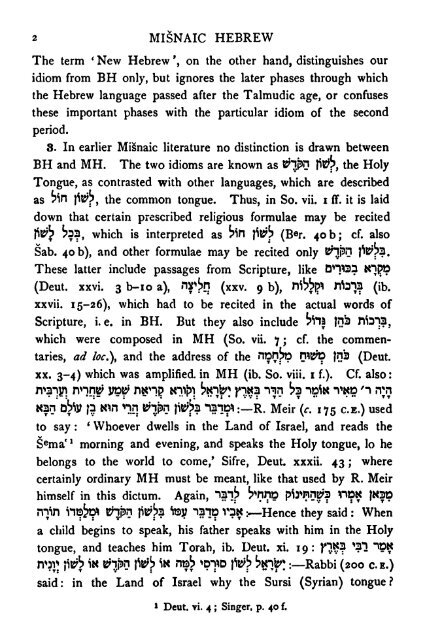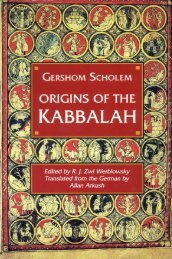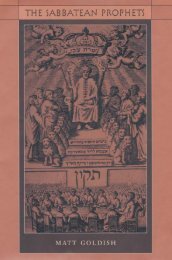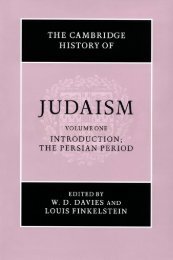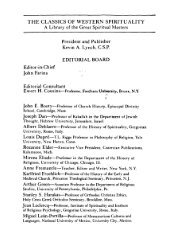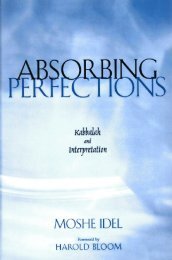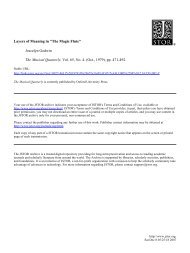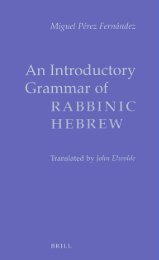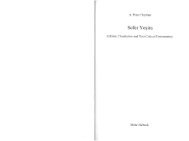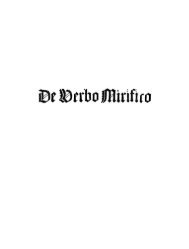- Page 1 and 2: M. H. SEGAL A Grammar of Mishnaic H
- Page 4 and 5: A GRAMMAR OF MISHNAIC HEBREW BY M.
- Page 6 and 7: PREFACE 'THHIS little book has been
- Page 8: PREFACE vii errors, it will be due
- Page 11 and 12: X CONTENTS PART I PHONOLOGY AND ORT
- Page 13 and 14: SECT. 9. 61. Metathesis 62. Aphaere
- Page 15 and 16: xiv CONTENTS SECT. PAGE 93. Old Hb
- Page 17 and 18: SECT. ^35- (») First radical a den
- Page 19 and 20: xviii CONTENTS (6) VERBS y^y. SECT.
- Page 21 and 22: XX CONTENTS SECT. PAGE 241. QittHl,
- Page 23 and 24: xxii CONTENTS SECT. PAGE 289. Fem.
- Page 25 and 26: xxiv CONTENTS SECT. PAGE 324. Of th
- Page 27 and 28: xxvi CONTENTS SECT. PAGE 362. Useof
- Page 29 and 30: xxviii CONTENTS SECT. PAGE 398. (2)
- Page 31 and 32: XXX CONTENTS IV. SENTENCES AND CLAU
- Page 33 and 34: xxxii CONTENTS SECT. PAGE 479. Co-o
- Page 35 and 36: xxxiv CONTENTS 16. Final Clauses. S
- Page 37 and 38: XXXVl Seq. Ta'a. Tam. Tern. Ter. To
- Page 39 and 40: LITERATURE A. Geiger, Lehr- u, Lese
- Page 41 and 42: xl ADDENDA Sect. 187. Cf. Earth's n
- Page 46 and 47: INTRODUCTION 3 Either the Holy tong
- Page 48 and 49: INTRODUCTION 5 even in the middle o
- Page 50 and 51: INTRODUCTION 7 development. They ar
- Page 52 and 53: INTRODUCTION 9 both the elements of
- Page 54 and 55: INTRODUCTION ii establishes the imp
- Page 56 and 57: INTRODUCTION 13 ^^Hi pab?^ 5; n>}«
- Page 58 and 59: INTRODUCTION 15 the reign of Herod.
- Page 60 and 61: INTRODUCTION 17 Jews, or that the c
- Page 62 and 63: INTRODUCTION 19 character, and from
- Page 64 and 65: PART I PHONOLOGY AND ORTHOGRAPHY I.
- Page 66 and 67: PRONUNCIATION 33 (3) Information in
- Page 68 and 69: THE VOWELS 25 2. The Spelling, of V
- Page 70 and 71: THE CONSONANTS 27 nounced with K or
- Page 72 and 73: THE CONSONANTS 29 2. The Palatals 3
- Page 74 and 75: THE CONSONANTS 31 KvjScta, San. iii
- Page 76 and 77: THE CONSONANTS 33 V represents some
- Page 78 and 79: THE CONSONANTS 35 arjp, Sab. xi. 3.
- Page 80 and 81: THE CONSONANTS 37 xxiii. 5 = ; ^"'
- Page 82 and 83: PART II M O R P H O L O G Y I. THE
- Page 84 and 85: PERSONAL PRONOUNS 41 71. The Pronom
- Page 86 and 87: RELATIVE PRONOUNS 43 section of the
- Page 88 and 89: INTERROGATIVE PRONOUNS 45 consider
- Page 90 and 91: THE VERB 47 ni^n, nnn, inn, nar, ^i
- Page 92 and 93: THE VERB 49 supposed. It may safely
- Page 94 and 95:
THE VERB 51 96. (7) Verbs borrowed
- Page 96 and 97:
THE VERB 53 b2p, nnp, Dnp, 5np, bbp
- Page 98 and 99:
THE VERB 55 Niph'al: ina, B^m, ^Ai,
- Page 100 and 101:
THE VERB 57 niD, pbo, psD, ntsy, Dv
- Page 102 and 103:
VERBAL STEMS 59 in the formation of
- Page 104 and 105:
VERBAL STEMS 6i 124. (ii) Causative
- Page 106 and 107:
VERBAL STEMS 63 i. i; nan^ytp mixed
- Page 108 and 109:
VERBAL STEMS 65 a-linn he * donated
- Page 110 and 111:
VERBAL STEMS 67 140. (v) Finally, t
- Page 112 and 113:
VERBAL STEMS 69 to become old, rott
- Page 114 and 115:
THE TENSES li thou hast fulfilled,
- Page 116 and 117:
THE TENSES 73 157. As is well known
- Page 118 and 119:
WEAK VERBS 75 (2) VERBS ^''a. 163.
- Page 120 and 121:
WEAK VERBS 77 Ter. V. 9; ^?n?1« (c
- Page 122 and 123:
WEAK VERBS 79 171. (ii) Niph'al. Pe
- Page 124 and 125:
WEAK VERBS 8i K«t. 67 b; i^Bl? to
- Page 126 and 127:
WEAK VERBS 83 V. 3; r)ST)^)iO with
- Page 128 and 129:
WEAK VERBS 85 Yo. i. 7; Sebu. iii.
- Page 130 and 131:
WEAK VERBS 87 to shake, t. Hul. ii.
- Page 132 and 133:
WEAK VERBS 89 196. HipKil : "^BH N^
- Page 134 and 135:
The imperf. as in BH. WEAK VERBS 91
- Page 136 and 137:
WEAK VERBS 93 presence, *Er. vii. 1
- Page 138 and 139:
WEAK VERBS 95 7 a; j. MQ iii. 5; to
- Page 140 and 141:
WEAK VERBS 97 to steal; ^nsn NeJ. i
- Page 142 and 143:
THE NOUN 99 also found in BH. A num
- Page 144 and 145:
FORMATION OF NOUNS io[ antelope, Bi
- Page 146 and 147:
FORMATION OF NOUNS 103 derived from
- Page 148 and 149:
FORMATION OF NOUNS 105 subtle, So.
- Page 150 and 151:
FORMATION OF NOUNS 107 ments : "^^P
- Page 152 and 153:
FORMATION OF NOUNS 109 physical def
- Page 154 and 155:
FORMATION OF NOUNS in The other exa
- Page 156 and 157:
FORMATION OF NOUNS 113 thinking. Ab
- Page 158 and 159:
FORMATION OF NOUNS 115 doing good,
- Page 160 and 161:
FORMATION OF NOUNS ,17 spelt with 1
- Page 162 and 163:
FORMATION OF NOUNS 119 {5) Nouns fo
- Page 164 and 165:
FORMATION OF NOUNS 121 n-'ob^n^ Jer
- Page 166 and 167:
FORMATION OF NOUNS 123 (^iel\ "»^'
- Page 168 and 169:
FORMATION OF FEMININE NOUNS 125 3.
- Page 170 and 171:
FORMATION OF PLURAL NOUNS 127 is al
- Page 172 and 173:
FORMATION OF PLURAL NOUNS 129 middl
- Page 174 and 175:
FORMATION OF PLURAL NOUNS 131 gener
- Page 176 and 177:
FORMATION OF PLURAL NOUNS 133 more
- Page 178 and 179:
ADVERBS 135 Borrowings from Aram, a
- Page 180 and 181:
ADVERBS 137 T, with the preposition
- Page 182 and 183:
ADVERBS 139 could say (of an anthro
- Page 184 and 185:
ADVERBS 141 p;n^D (' chequer work')
- Page 186 and 187:
PREPOSITIONS 143 privately, 'AZ ii.
- Page 188 and 189:
PREPOSITIONS 145 Dgto in the name o
- Page 190 and 191:
CONJUNCTIONS 147 f, &c.); (t -^f^,
- Page 192 and 193:
INTERJECTIONS 149 305. (2) Words an
- Page 194 and 195:
THE PERFECT TENSE 151 ••rDtt fT
- Page 196 and 197:
THE PERFECT TENSE 153 312. Sometime
- Page 198 and 199:
THE IMPERFECT TENSE 155 819. The im
- Page 200 and 201:
THE PARTICIPLE 157 if not, scholars
- Page 202 and 203:
THE PARTICIPLE 159 ib. 3 b; 0^9 nN^
- Page 204 and 205:
THE PARTICIPLE i6i The following is
- Page 206 and 207:
THE PARTICIPLE 163 neither do they
- Page 208 and 209:
THE PARTICIPLE 165 past: Judges i.
- Page 210 and 211:
THE INFINITIVE 167 (as impure), ib.
- Page 212 and 213:
GOVERNMENT OF THE VERB 169 364. The
- Page 214 and 215:
GOVERNMENT OF THE VERB 171 (2) Subo
- Page 216 and 217:
GOVERNMENT OF THE VERB 173 (ii) To
- Page 218 and 219:
GOVERNMENT OF THE VERB 175 to his h
- Page 220 and 221:
GOVERNMENT OF THE VERR 177 wards, Y
- Page 222 and 223:
DETERMINATION OF GENDER 179 369. Th
- Page 224 and 225:
USE OF THE ARTICLE i8i (iii) With t
- Page 226 and 227:
USE OF THE ARTICLE 183 (iii) With s
- Page 228 and 229:
EXPRESSION OF THE GENITIVE 185 The
- Page 230 and 231:
EXPRESSION OF THE GENITIVE 187 (i)
- Page 232 and 233:
EXPRESSION OF THE GENITIVE 189 il^a
- Page 234 and 235:
EXPRESSION OF THE GENITIVE 191 rect
- Page 236 and 237:
COMPARISON OF ADJECTIVES 193 found
- Page 238 and 239:
NUMERALS 195 state to the noun. The
- Page 240 and 241:
NUMERALS 197 §eq. i. I, 2 ; B^Vn?
- Page 242 and 243:
PERSONAL PRONOUNS 199 a field ? 'Er
- Page 244 and 245:
POSSESSIVE PRONOUNS 201 by a relati
- Page 246 and 247:
INTERROGATIVE PRONOUN 203 4. The In
- Page 248 and 249:
RELATIVE PRONOUN 205 apparent in ca
- Page 250 and 251:
REFLEXIVE AND RECIPROCAL 207 Nomin.
- Page 252 and 253:
EXPRESSION OF THE INDEFINITE 209 he
- Page 254 and 255:
EXPRESSION OF THE INDEFINITE 211 on
- Page 256 and 257:
NOMINATIVE ABSOLUTE 213 eat of grap
- Page 258 and 259:
AGREEMENT 215 (Nirten viz.) nb N©p
- Page 260 and 261:
SENTENCES EXPRESSING AN OATH 217 §
- Page 262 and 263:
SENTENCES EXPRESSING AN OATH 219 ii
- Page 264 and 265:
INTERROGATIVE SENTENCES 221 they no
- Page 266 and 267:
DESIDERATIVE SENTENCES 223 sense. I
- Page 268 and 269:
NEGATIVE SENTENCES 225 but cf. the
- Page 270 and 271:
CAUSAL CLAUSES 227 shape of a viney
- Page 272 and 273:
CONDITIONAL SENTENCES 229 in the pr
- Page 274 and 275:
CONDITIONAL SENTENCES 231 chastity,
- Page 276 and 277:
COMPARATIVE CLAUSES 333 496. A comp
- Page 278 and 279:
COMPARATIVE CLAUSES 235 Mak. iii. 1
- Page 280 and 281:
ADVERSATIVE CLAUSES 237 case in opp
- Page 282 and 283:
ADVERSATIVE CLAUSES 239 n^inab VP^V
- Page 284 and 285:
TEMPORAL CLAUSES 241 reached . . .
- Page 286 and 287:
CONSECUTIVE CLAUSES 243 n^jn n^y ho
- Page 288 and 289:
DEUTERONOMY IX. 7 32 34 XI. 5 XUl.
- Page 290 and 291:
ESTHER. i. 22 ii. 7 15 18 23 iii. 1
- Page 292:
This little book has been written w


